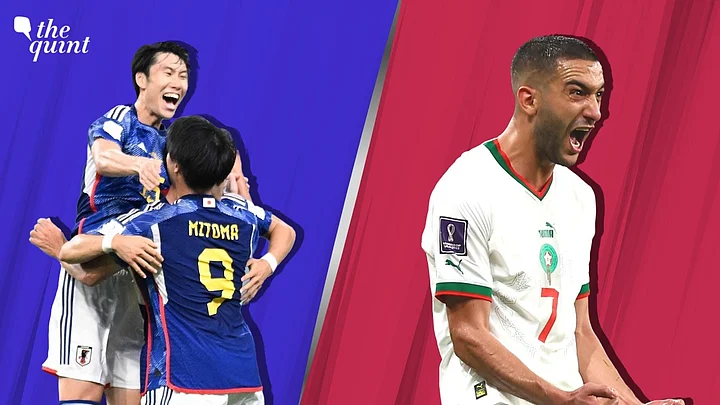“Some people believe football is a matter of life and death. I am very disappointed with that attitude" said Bill Shankly, the legendary former manager of Liverpool. Indeed, for those who don’t claim to be fans of the game, the passion on display from the loyalists could, at times, seem to be a cringe-worthy exaggeration.
The statement, coming from one of the game’s most venerated tacticians, might have corroborated that belief, if only Shankly did not follow it up with a statement that left everyone stunned – “I can assure you, it is much more serious than that.”
Thousands of Japanese supporters, who had gathered at Al Rayyan’s Khalifa International Stadium to watch their team’s last FIFA World Cup 2022 group stage match, will happily validate Shankly’s statement, as their team had just done the unthinkable.
When the legends of world football assembled at Doha on the first of April to organise the draw of the competition, Japanese citizens might have felt it was a grand April Fools’ Day prank. They were drawn into what was then called the ‘group of death,’ involving Spain and Germany.
In comparison with the two European giants, Japan has had a very contrasting journey in football. When Spain had their first major chance of winning the World Cup – back in 1950 where they stood fourth, Japan could ill afford to even harbour a dream of that.
The Japanese Dream
Five years ago, their football governing body was disbanded following financial duress, while only three years prior to the tournament, the world was stunned by the devastation caused by ‘Fat Man’ and ‘Little Boy' in Hiroshima and Nagasaki.
Germany, one of Japan’s allies from World War II, won the very next edition of the World Cup, but all that Samurai Blue could do, was wait. And wait they did, until they made their first World Cup appearance five decades later in 1998.
The nation has since played every edition of the tournament, but all of their achievements in the sport were eclipsed when they defeated Spain by a 2-1 margin in Qatar. The Japanese vocabulary was rejigged to omit every antonym of ‘possible’ – not only had they made it to the next stage, but they also topped the group.
Japan – First. Spain – Second. Germany – Third. History, re-written.
But Japan’s story is not a standalone case of an underdog uprising from the World Cup in Qatar. The tournament made headlines for all the wrong reasons ahead of its commencements. The human rights record of the country was rightfully questioned, views regarding the LGBTQ+ community were justifiably lambasted, and the sanctity of FIFA was understandably scrutinised.
But when the ball started rolling, football provided the nations what corruption-infested politics and greed-stained ethos could not – a level playing field.
The game taught the 32 nations that irrespective of their background, colour, creed and culture, everyone will have equal chances to shine and let their presence be known to the world.
Japan did, and so did Morocco.
Love in Casablanca, but Not the Bogart Kind
Around when Japan were still recovering from the nuclear bombing, Spain were trying hard to win their maiden World Cup and Germany had just achieved that, Morocco, in essence, did not even exist. They were battling a different battle altogether – fighting for independence as France and Spain fancied a piece of the land.
Belgium, though not among the favourites, was still a regular feature in World Cups during that era. But seven decades later, the world number two of world football were eliminated by eleven Moroccan players who dared to dream.
The Atlas Lions, like the Japanese, could easily have rued their misfortunate when they were drawn in the same group with a prime title contender in Belgium, and the 2018 runners-up in Croatia. But what transpired over the last ten days might have surpassed expectations in that North African country.
Morocco first held Croatia to a 0-0 draw, before pulling off a shock 2-0 win over Belgium. Just to prove the performance was not a one-in-a-million fluke show, they also defeated Canada in their last group stage match to top the group standings.
Morocco – First. Croatia – Second. Belgium – Third. History, re-written.
Other Stories of Turning Tides
In a few days, Morocco and Japan will compete in the round of 16, but it is only right to mention the plethora of instances where teams punched above their weights and defied limits, except that they could not make it to the next round. Amid the tumultuous political situation back home, the Iranian citizens received two presents from their players.
Firstly, the footballers decided to show solidarity with the protestors by not singing the national anthem, but then went on to surpass their own act by beating Wales 2-0.
Tunisia, who were a part of France for the first five editions of the World Cup, tasted a 21st century-esque independence when they defeated the French 1-0.
Saudi Arabia, who did not even have a team until the 1950s, gave Argentina the shock of their lives. Ecuador, who made exactly zero World Cup appearances for all of the last century, held the Netherlands to a draw.
As cricket had shown in the recently concluded ICC Men’s T20 World Cup 2022, while almost every minuscule aspect of modern society might seem to be skewed, conveniently tailored to meet the needs of those in power, sport remains the solitary, and universal, great leveller.
(At The Quint, we question everything. Play an active role in shaping our journalism by becoming a member today.)
